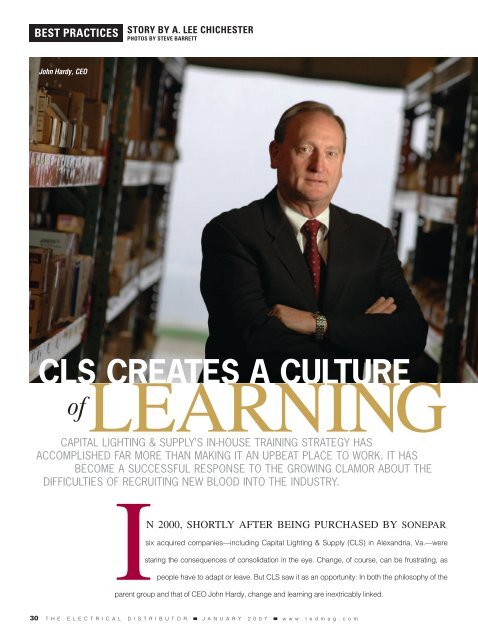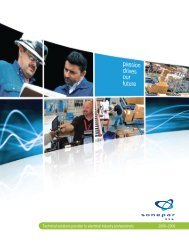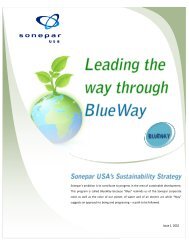Create successful ePaper yourself
Turn your PDF publications into a flip-book with our unique Google optimized e-Paper software.
BEST PRACTICES<br />
John Hardy, CEO<br />
STORY BY A. LEE CHICHESTER<br />
PHOTOS BY STEVE BARRETT<br />
<strong>CLS</strong> <strong>CREATES</strong> A <strong>CULTURE</strong><br />
LEARNING<br />
of<br />
CAPITAL LIGHTING & SUPPLY’S IN-HOUSE TRAINING STRATEGY HAS<br />
ACCOMPLISHED FAR MORE THAN MAKING IT AN UPBEAT PLACE TO WORK. IT HAS<br />
BECOME A SUCCESSFUL RESPONSE TO THE GROWING CLAMOR ABOUT THE<br />
DIFFICULTIES OF RECRUITING NEW BLOOD INTO THE INDUSTRY.<br />
IN 2000, SHORTLY AFTER BEING PURCHASED BY SONEPAR,<br />
six acquired companies—including Capital Lighting & Supply (<strong>CLS</strong>) in Alexandria, Va.—were<br />
staring the consequences of consolidation in the eye. Change, of course, can be frustrating, as<br />
people have to adapt or leave. But <strong>CLS</strong> saw it as an opportunity: In both the philosophy of the<br />
parent group and that of CEO John Hardy, change and learning are inextricably linked.<br />
30 T H E E L E C T R I C A L D I S T R I B U T O R ■ J A N U A R Y 2 0 0 7 ■ w w w . t e d m a g . c o m
<strong>Sonepar</strong> USA functions by pushing management<br />
as close to customers as possible.<br />
“<strong>Sonepar</strong> recognizes that success in our<br />
industry means being fast to the market,” said<br />
Hardy. “It also realizes that each customer<br />
base is different—and to serve a market, a<br />
company has to be close to its customers.”<br />
So, in all of its worldwide operations, <strong>Sonepar</strong><br />
buys into management, trusting them to do<br />
what’s best for their markets.<br />
That managerial model—empowering the<br />
front lines to make decisions and assuring<br />
them the tools they need to make the best<br />
ones—has formed the culture of <strong>CLS</strong>.<br />
“In talking to other NAED members, one<br />
thing I’d say that is unique about <strong>CLS</strong> is<br />
that we truly teach a spirit of entrepreneurship,”<br />
said Mike Hensley, president of<br />
<strong>CLS</strong>’s Northern Division. “We push each<br />
person to take ownership of the business,<br />
make plans for success, and suit his or her<br />
decisions to the market. If a bad decision<br />
is made, so what? Let’s just not make the<br />
same ones over and over.<br />
“Empowerment is something to see,” he<br />
continued. “When you train and educate to the<br />
point where people have the skill sets to find<br />
the data they require, they’ll make great decisions.<br />
Every day our people make decisions<br />
that make our business better.”<br />
For example, Tyler Macklin,<br />
a warehouse manager at <strong>CLS</strong>,<br />
explained how the company<br />
had been having problems<br />
with items missing from deliveries.<br />
“We wracked our brains<br />
to come up with a solution—a<br />
way to be absolutely sure that<br />
the problem was on our end so<br />
we could fix it,” said Macklin.<br />
The answer was simple: digital<br />
cameras. “Now we have our<br />
drivers carry them, and each<br />
time they deliver a house pack,<br />
they take a picture of it.”<br />
This solution, she noted, is<br />
already yielding results for the<br />
company. “If a customer reports<br />
something missing, we<br />
can look at the photo and say,<br />
‘Oh, you’re right—we left that<br />
in the warehouse.’ And then<br />
we can develop a procedure<br />
to fix it,” she said. “But if we<br />
look at the photo and say, ‘This<br />
shows that it was there at 8<br />
Mike Hensley,<br />
president of<br />
<strong>CLS</strong>’s Northern<br />
Division<br />
o’clock this morning,’ that tells the customer<br />
that he or she might have a theft problem.<br />
Customers appreciate this type of feedback<br />
because it opens doors to real solutions.<br />
“The great aspect of working at <strong>CLS</strong> is<br />
the freedom each employee has to make<br />
changes,” she continued. “No one is stifled;<br />
from the warehouse to the CEO, everyone<br />
has input. Even if an idea isn’t implemented,<br />
the atmosphere for coming up with new<br />
ideas is nurtured.”<br />
The building blocks<br />
of a culture<br />
An infrastructure that builds confidence<br />
enough that employees take responsibility for<br />
their decisions is the foundation upon which a<br />
culture of learning is built. <strong>CLS</strong> uses three primary<br />
outside vendors for its training curricula:<br />
Achieve Global, Skillsoft, and NAED. The<br />
company also develops measures, modules,<br />
and process training in-house. Sales and<br />
management training include two- to threeday<br />
off-site sessions; a recently developed<br />
intranet that delivers <strong>CLS</strong> processes and procedures;<br />
and Web-based modules that can<br />
be accessed for leadership, Microsoft Office,<br />
and vendor training.<br />
Envisioned in a 2003 Strategic Planning<br />
Session, the infrastructure for this extensive<br />
Continued on page 32<br />
THE HISTORY<br />
of<br />
<strong>CLS</strong><br />
THE YEAR 1999<br />
marked a transition<br />
crisis for what was then<br />
Capital Lighting & Supply, originally<br />
founded in 1957. The<br />
death of the majority shareholder<br />
left the “No. 2 guy,”<br />
John Hardy, talking to only one<br />
potential buyer: <strong>Sonepar</strong>, which<br />
purchased the business in 2000.<br />
<strong>Sonepar</strong> North America—<br />
parent to electrical supply<br />
distributors in the United<br />
States, Canada, and Mexico—is<br />
a member of the global<br />
<strong>Sonepar</strong> group—the world’s<br />
largest privately held electrical<br />
distributor. Worldwide,<br />
<strong>Sonepar</strong> employs more than<br />
19,000 employees, with 1,000<br />
branch locations and annual<br />
sales of nearly $7 billion.<br />
At the time of purchase, <strong>CLS</strong><br />
was a $50 million revenue<br />
company (today it’s $225<br />
million with projected growth of<br />
$400 million by 2010). <strong>Sonepar</strong><br />
had already bought Lee Electric,<br />
and after acquiring <strong>CLS</strong>, rolled<br />
Dixie Electric Supply, Dell<br />
Electric Supply, Elite Electric<br />
Supply, and Daniels Electric (all<br />
in the Virginia/Maryland region)<br />
into what is today <strong>CLS</strong>.<br />
“We had six sets of bad<br />
inventory,” recalled John<br />
Hardy, CEO. “Six IT conversions.<br />
Six cultures. So we built<br />
a central distribution facility. We<br />
spent 2002 integrating the<br />
businesses into what is now<br />
<strong>CLS</strong>—totally reborn as a new<br />
entity since about 2003. I’m not<br />
sure why our people came to<br />
work every day given those<br />
challenges. But they did. And<br />
we got it done.”<br />
w w w . t e d m a g . c o m ■ J A N U A R Y 2 0 0 7 ■ T H E E L E C T R I C A L D I S T R I B U T O R 31
BEST PRACTICES<br />
Continued from page 31<br />
training was rolled out in early 2005, beginning<br />
with all managers—including the<br />
CEO, CFO, presidents, vice presidents,<br />
branch managers, and supervisors.<br />
“We found that the No. 1 determinant of<br />
success or failure of any educational program<br />
was the level of participation of the<br />
management,” said Tim McGowan, director<br />
of process management and training. “The<br />
one absolutely essential element is the total<br />
buy-in of every manager in the company.”<br />
As a manager, Hensley helps his people<br />
make time. “I’ve had several people tell<br />
me, ‘I can’t go to the training; I’ll have to<br />
reschedule.’ I tell them that’s not an option.<br />
My job is to help everyone participate,<br />
even if that means rearranging schedules<br />
to get that job done.”<br />
Managers grow people<br />
Training in what educators commonly<br />
refer to as soft skills—those difficult-toquantify<br />
behaviors like communicating,<br />
problem solving, and active listening—is<br />
the crux of the <strong>CLS</strong> training called Interpersonal<br />
Management Skills (IMS). These<br />
skills include how to open a conversation,<br />
how to clarify and confirm what was<br />
heard, how to deal with situations where<br />
there is disagreement, and how to credit<br />
another’s input.<br />
“A manager doesn’t get paid for current<br />
Tim McGowan,<br />
director of process<br />
management and<br />
training. David Wolfe<br />
in the background.<br />
decisions,” said McGowan. “Managers get<br />
paid for the impact their current decisions<br />
have on future results.”<br />
“The IMS training program gives our<br />
managers the confidence to develop<br />
people—to grow the individuals who will<br />
replace them when they move up or retire,”<br />
said Mike Bourn, president of the<br />
Southern Division.<br />
Hensley has worked for <strong>CLS</strong> for four<br />
years and can prove that the company is<br />
growing its own people. “Recently, we had<br />
to replace four people in one of our locations<br />
within a very short period,” he said.<br />
“Instead of having to find people from outside<br />
to populate that store, we were able to<br />
hire from within. That would never have<br />
happened two years ago.<br />
“This tells me that we’re on the right<br />
track,” he continued. “You have to have<br />
your own farm team. Successful businesses<br />
have a deep bench to draw from.<br />
“This is a major success not only for our<br />
company, but also for our people,” he<br />
added. “One of the workers we’ve put<br />
behind the counter was in the warehouse<br />
two years ago. He came to me the other<br />
day and told me to look out the window at<br />
the parking lot; I saw a brand new car.<br />
“That’s what developing the individuals<br />
within your company is all about—he’s<br />
proud of his car, he’s proud of his job, and<br />
he’s building a career,” he said.<br />
Investing in people<br />
32 T H E E L E C T R I C A L D I S T R I B U T O R ■ J A N U A R Y 2 0 0 7 ■ w w w . t e d m a g . c o m<br />
“Three components make up our business:<br />
time, money, and people,” said<br />
Bourn. “Given that this is such a people<br />
business, if you’re spending your money<br />
on your people, they’re going to pay you<br />
back with time.”<br />
Sure, it’s expensive. <strong>CLS</strong> not only pays<br />
for the three-day, off-site training in soft<br />
skills, but also encourages everyone to<br />
take work time to access online courses<br />
they need to get closer to error-free<br />
processes and service delivery.<br />
“All of the people involved in our industry<br />
have a choice, including our employees,”<br />
noted Hardy. “We don’t forget<br />
that all of the people with whom we interact<br />
have the discretion to choose whether or<br />
not to have a relationship with us. The key<br />
for us is to create an organization that<br />
allows people to grow, encourages them to<br />
grow, and has accessible resources in<br />
place for them to choose to grow.”<br />
It becomes quite energizing for a group<br />
of people to fully understand that their<br />
company is willing to invest substantial<br />
resources in them.<br />
McGowan mentioned that the company<br />
recently provided training for its drivers in<br />
the course Providing Stellar Customer<br />
Service/Healing Customer Relationships.<br />
“We gathered 62 drivers in four locations<br />
on a Saturday,” he said. “They<br />
walked in wondering what they were doing<br />
there. By the end of the day, we had to<br />
kick them out; they were so energized.”<br />
Jerry Kelly, Baltimore warehouse supervisor,<br />
said, “I learned that my people<br />
have a lot more problem-solving skills than<br />
I had given them credit for. They had good<br />
ideas and asked for tools to help keep the<br />
customer satisfied—for example, having<br />
giveaways on hand to help smooth a<br />
touchy situation. That was something I’d<br />
have never thought of.”<br />
“Helping every person at the company<br />
feel involved and valuable is the investment<br />
we’re making,” added McGowan.<br />
“We’re already seeing a return on that<br />
investment in terms of loyalty, morale, error<br />
reduction, and productivity.”<br />
Results offer proof<br />
The old adage is that “change is hard.” In<br />
many respects, that’s true. But change<br />
also keeps a company vibrant, alive, and
thriving. To change is to learn new things,<br />
and when people know there are resources<br />
available to help them adapt to<br />
change, they are grateful. Customers notice<br />
not only improved understanding<br />
skills, but also higher morale.<br />
“The reality is that a company could<br />
not have survived the changes <strong>CLS</strong> has<br />
gone through without employing a culture<br />
of learning,” noted Hardy. Shortly after<br />
the introduction of the IMS and the PSS<br />
classes, successes were apparent, and<br />
people began to clamor to participate. It’s<br />
a running joke throughout the branches<br />
for one to recognize a communications<br />
technique being used by a co-worker<br />
and to ask, “Are you IMS-ing me?”<br />
“We can actually see the result of the<br />
communications training on our bottom<br />
line,” said Brian Chavis, Richmond branch<br />
manager. "Now people don’t buckle to the<br />
everyday stresses so easily. They make<br />
more good decisions and fewer errors,<br />
and serve the customers better. We can<br />
actually see the difference in our company’s<br />
numbers.”<br />
People are recommending jobs at<br />
<strong>CLS</strong> to nonindustry people like their<br />
friends and families. People within the<br />
industry are beginning to notice, too. “We<br />
have just had four people join us en<br />
masse,” said Ken Cain, vice president of<br />
marketing. “They’re the beginning of our<br />
Energy Maintenance and Systems group,<br />
and they came together from within the<br />
industry to work with <strong>CLS</strong>.”<br />
Dave Dixon works in outside sales and<br />
has been with <strong>CLS</strong> for one year. “Because<br />
of the quality of training offered<br />
here, I was able to get up to speed in<br />
about three months,” he said. “Today,<br />
<strong>CLS</strong> has the ability to selectively choose<br />
quality people from within the market to<br />
work here because they offer that level of<br />
training and self-determination.<br />
“The training itself is simply invaluable,”<br />
he continued. “A particular contractor in<br />
my sphere of work at my past employer<br />
had had a difficult experience with <strong>CLS</strong><br />
before the changes were made here. He<br />
was not happy when he discovered that I<br />
had come on board here, but with the approach<br />
to problem solving I’ve learned at<br />
<strong>CLS</strong>, I was able to talk him through his<br />
hesitation about joining me.<br />
“I invited the opportunity for him to lay<br />
all of his cards on the table, and together<br />
we went over the various alternatives. I<br />
assured him that he could rely on me to<br />
be his go-to guy here. And by building<br />
on that past relationship and initiating an<br />
honest conversation about this new one,<br />
I was able to bring him with me,” explained<br />
Dixon.<br />
“Every day our people are discovering<br />
new ways to learn and access information,”<br />
said Hardy. “As they find things<br />
Circle 113 on Direct Info Card<br />
they want to learn and discover ways<br />
they want to grow, we’re able to provide<br />
it. As long as people within the organization<br />
are learning and changing—and as<br />
long as these people really invest<br />
themselves in the progress and success<br />
of the company—then we’ll succeed. It’s<br />
that basic.” ■ ■ ■<br />
Chichester can be reached online at<br />
falconer@swva.net.<br />
w w w . t e d m a g . c o m ■ J A N U A R Y 2 0 0 7 ■ T H E E L E C T R I C A L D I S T R I B U T O R 33





